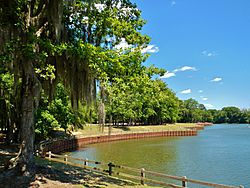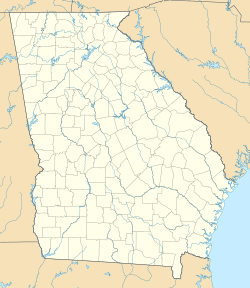Roods Landing Site facts for kids

Roods Creek Landing Recreation Area, location of the Roods Creek Mounds.
|
|
| Location | Omaha, Georgia, Stewart County, Georgia, |
|---|---|
| Region | Stewart County, Georgia |
| Coordinates | 32°1′28.02″N 85°2′39.98″W / 32.0244500°N 85.0444389°W |
| History | |
| Cultures | Middle Woodland, South Appalachian Mississippian culture |
| Site notes | |
| Architecture | |
| Architectural styles | platform mound |
| Architectural details | Number of temples: |
|
Roods Landing Site
|
|
| Area | 100 acres (40.5 ha) |
| NRHP reference No. | 75000609 |
| Added to NRHP | August 19, 1975 |
| Responsible body: Private | |
The Roods Landing Site, also called the Roods Creek Mounds, is an amazing archaeological site. An archaeological site is a place where people lived a long time ago. It is located in Stewart County, Georgia, in the United States. You can find it where Rood Creek meets the Chattahoochee River.
This site has many earthen mounds, which are hills made by people. These mounds were built by ancient cultures. They were built during the Middle Woodland and Mississippian periods. These periods happened before Christopher Columbus came to America. That is why we call them "Pre-Columbian." The Roods Landing Site was added to the National Register of Historic Places on August 19, 1975. This means it is a very important historical place.
Exploring the Roods Landing Site
The Roods Landing Site is a very large area with many mounds. There are eight platform mounds here. A platform mound is a special type of mound. It has a flat top, like a platform. People often built important buildings on top of these mounds.
Mound A: The Biggest Mound
The largest mound at the site is called Mound A. It stands about 7.6 meters (25 feet) tall. Its base is about 44.2 meters (145 feet) long and 38.1 meters (125 feet) wide. The top of Mound A was also flat. It had three special buildings on it. These buildings were made from "wattle and daub." This is a building method using woven branches (wattle) covered with mud or clay (daub).
The top of the mound was covered with yellow clay. It had a raised edge, like a low wall, around it. This wall was about 60 to 90 centimeters (2 to 3 feet) high. There were two ramps leading down from the top of Mound A to the ground. Each ramp was about 15.2 meters (50 feet) long. One ramp faced a large open area called a plaza. This plaza was across from another mound, Mound E.
Digging into History: Excavations
Many years ago, a famous archaeologist named Clarence Bloomfield Moore wanted to dig at this site. He thought it looked a bit like another important site called Moundville. However, he was not allowed to dig here.
Later, in 1955, another archaeologist named Joseph Caldwell did get to excavate the site. "Excavate" means to carefully dig up and study ancient remains. Since Caldwell's work, no other major digs have happened.
The Roods Landing Site is still considered a very important place. It has many mounds and holds many secrets about the people who lived there long ago. If you want to visit, you usually need to join a special tour.



